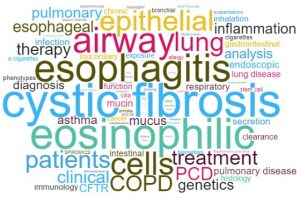CF RTCC Research
The UNC CF RTCC is a NIH funding mechanism under which we have set as our long-term goal the systemic “cure” of the cystic fibrosis (CF) phenotype, including in the GI tract, pancreas, and lung. There is a broad need on the UNC-CH campus for a Core Research Center to synergize and accelerate the pace of therapeutics development for CF. Our CF research base is broad and encompasses groups with expertise in CFTR biogenesis/ion transport, genetics, gene therapy, GI and airway epithelial cell biology, mucus/mucin biochemistry and biophysics, microbiology/immunology, and clinical research. This group of investigators with CF therapeutic interests includes presently > 100 faculty. To accelerate therapeutics development on the UNC-CH campus, there are needs for accurate and efficient in vitro and in vivo testing of therapeutic agents, access to diverse and sufficient supplies of epithelial cells (GI, airway), access to new mucus/mucin technologies relevant to CF pathogenesis, and a clinical research network that provides patient specimens, clinical testing, and advisory services necessary for the therapeutics development process.

In response to these needs, we have proposed a CF RTCC with four service cores that are designed to provide access to their reagents/technologies for UNC, national, and international investigators. The CF RTCC will service a broad spectrum of therapies, including new chemical entities (NCEs), gene transfer vectors, and gene modification approaches. The four service cores include: (1) the Molecular/Functional Measurement Core (Martina Gentzsch, PI),which will offer state of the art in vitro measures of CFTR function in GI and airway systems, complemented by novel mutant CFTR, mutant mucin, and βENaC mice, complemented by new CF rabbit models, for in vivo studies of CF molecular pathogenesis/therapeutics and GI/airway epithelial disease; (2) the Cell Models Core (Scott Randell, PI),which builds on its world-class experience in providing high-quality primary, P1, P2, conditionally reprogrammed cells (CRC), and immortalized cells, and robust GI stem cell techniques for provision of organoid and novel 2D cultures; (3) the Mucus Biochemistry and Biophysics Core (Brian Button, PI), which will provide access to unparalleled new measures of the key biochemical and biophysical mucus abnormalities that relate to CF pathogenesis and therapeutics and novel biomarker development; and (4) The Clinical Translation Core (Scott Donaldson, PI), which will provide the requisite GI biopsies for epithelial pathogenesis and genotype-specific therapeutic studies, generate sputum repositories, bring a spectrum of novel imaging technologies (including F19 based MRI ventilation/washout kinetics measures) into the CF field, and provide advice to the UNC CF and outside communities to with respect to therapeutics development. These Cores will be supported by an Administrative Core (R. Boucher, PI), which will oversee budgetary, communication, and program enhancement functions. The UNC CF RTCC is designed to provide a wide spectrum of services that are critical for CF studies of epithelial pathogenesis and therapeutics development in a fashion that will be inclusive and helpful.
The UNC CF RTCC is further supported by the Cores permanently housed in the Marsico Lung Institute. Information about these Cores can be found here.